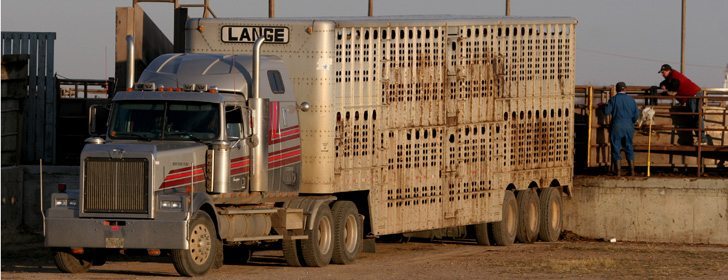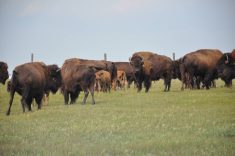CCA releases numbers | Association lobbying Americans to drop World Trade Organization appeal and amend law
Canadian exports of feeder and fed cattle dropped by 880,000 head in the 80 weeks after the United States implemented its country-of-origin labelling legislation.
On average, 6,000 fewer feeder cattle per week and 5,000 fewer fed cattle per week were exported to the U.S. in that period.
The fed cattle basis, which is the difference between Canadian and U.S. fed cattle cash prices, widened by 30 percent, or $4 US per hundredweight.
The Canadian Cattlemen’s Association released those statistics last week as it prepared for a U.S. government declaration on whether it will appeal a World Trade Organization ruling that found COOL discriminates against Canadian cattle and hogs.
Read Also

Trump’s tariffs take their toll on U.S. producers
U.S. farmers say Trump’s tariffs have been devastating for growers in that country.
The U.S. is expected to reveal its intentions in mid-March when it next meets with the WTO appeal body.
John Masswohl, the CCA’s director of government and international relations, said the organization receives many queries about COOL’s impact, so it decided to release some of the analysis developed by Daniel Sumner, a professor of economics at the University of California and former chief economist for the U.S. Department of Agriculture.
COOL’s impact on Canadian cattle and hog exports has fluctuated since its implementation Sept. 30, 2008, depending on market demands, said Masswohl, so it’s not a matter of simply calculating losses per head.
“We can certainly summarize it by saying that the marketplace is much more volatile now, from week to week and month to month, than it used to be. We can say that there has been an impact on the basis, a lasting impact on the basis.”
That impact is significant, given that changes in U.S. prices also affect prices offered in Canada. A basis difference of $4 per cwt. translates into a price difference of $48 per 1,200 pound animal.
“It is important to note that the effect of the basis difference caused by COOL is felt on every fed animal sold, regardless of whether it is exported or not, so any quantification of the impact of COOL would have to include total Canadian marketings, not just exports to the U.S.,” the CCA said in its first newsletter of 2012.
Masswohl said the CCA is proceeding as though the U.S. will appeal the decision, while also lobbying U.S. officials to amend the legislation rather than repeal it.
The CCA wants amendments that would eliminate the need for segregation of imported livestock and meat during U.S. processing.
Canadian cattle and pork producers have suggested a U.S. origin label on meat from animals slaughtered in the U.S., with voluntary inclusion of additional information about country of birth or feeding.
“What we’re trying to argue is why spend more taxpayer dollars, U.S. taxpayer dollars and Canadian taxpayer dollars, sending government lawyers to Geneva to argue to keep a law that’s bad for the U.S. economy,” said Masswohl.
“I think a lot of people that we’ve talked to have acknowledged that there really hasn’t been any benefit for the U.S. industry to have this measure in place.”
Analysis provided by Sumner indicates potential loss of 9,000 U.S. packing industry jobs if COOL continues as is. Overcapacity in the American packing industry could lead to layoffs or closures unless access to Canadian livestock is improved without the extra costs of segregation and labelling.
Masswohl said that possibility would encourage the industry to lobby for COOL amendments. As well, the National Cattlemen’s Beef Association, the largest beef producer group in the U.S., has recommended resolution rather than appeal.
“We’re playing the cards that we have right now,” said Masswohl. “It’s their right to appeal it. In our view, it’s not in their interests to appeal it. It’s in their interests to resolve it and we’re trying to help them to see that.”
















